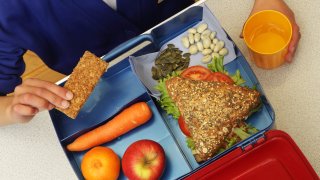
Thousands of students throughout New Jersey are newly eligible for free school lunches and/or breakfasts through legislation that was signed into law on Tuesday.
Governor Phil Murphy has signed the Working Class Families Anti-Hunger Act, which makes public and non-public schools participating in the National School Lunch Program and the federal School Breakfast Program able to provide free meals to students whose families have an annual household income of up to 224-percent of the federal poverty level.
Officials said this move will now make over 60,000 families newly eligible.
“Access to nutritious food is a basic necessity for our kids,” said Murphy, in a statement. “We have made great strides in our fight against food insecurity, working together with those on the front lines to ensure our most vulnerable community members have access to a warm meal and empowering our schools to meet the needs of their students. Expanding student eligibility under the Working Class Families Anti-Hunger Act will provide more of New Jersey’s young learners with a free school lunch and breakfast so that they can go to class ready to learn, rather than wondering where their next meal will come from."
Get Philly local news, weather forecasts, sports and entertainment stories to your inbox. Sign up for NBC Philadelphia newsletters.
According to New Jersey Assemblywoman Shama Haider (D-37th dist.), nearly 200,000 children throughout the state were found to be food insecure in 2019. This law, she said, will give thousands of children access to food that they may not have been able to obtain in the past.
“In 2019, there were 762,530 New Jersey residents — including 192,580 children — who were ‘food insecure,'” she said, in a statement. “That’s hundreds of thousands of children who don’t know where their next meal is coming from or if they’ll have a next meal. By giving more students access to meals, we are providing a lifeline for them and their families.”
Sign up for our Breaking newsletter to get the most urgent news stories in your inbox.

